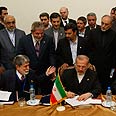
US still concerned over Iranian nukes
White House issues statement saying uranium swap deal between Iran, Brazil Turkey hasn’t allayed international community's concerns
WASHINGTON – The White House has issued its first statement regarding the recently-signed uranium swap deal between Iran, Turkey and Brazil in which it noted the international community would only consider the deal after the proposal is conveyed to the IAEA. The statement further noted that the US and the international community still have serious concerns over the Islamic Republic's nuclear program.
"Given Iran’s repeated failure to live up to its own commitments, and the need to address fundamental issues related to Iran’s nuclear program, the United States and international community continue to have serious concerns," the statement, issued by White House Press Secretary Robert Gibbs, read.
"While it would be a positive step for Iran to transfer low-enriched uranium off of its soil, Iran said today that it would continue its 20% enrichment, which is a direct violation of UN Security Council resolutions," it was further stated.
Russian President Dmitry Medvedev welcomed the agreement on Monday but expressed concern it will not fully meet the demands of the international community. During a visit in the Ukraine Medvedev noted that it appears the Islamic Republic still seeks to enrich uranium on its own soil and therefore causes continued concern for the world.
Iran announced Monday that it is willing to perform the uranium exchange on Turkish soil. The Foreign Ministry in Tehran declared that 1,200 kg of 3.5% level enriched uranium will be transferred to Ankara as part of the deal and will be retuned to Tehran after being made into fuel rods.
Iran's agreement was secured following a meeting between Iranian President Mahmoud Ahamadinejad, Brazilian President Luis Inacio Lula da Silva and Turkish Prime Minister Recep Tayyip Erdogan. Brazil and Turkey, both current Security Council members, have been mediating between Iran and the Western powers in an effort to prevent harsher sanctions.
Deal met with skepticism
Europe responded to the deal with skepticism. The office of EU foreign affairs chief Catherine Ashton in Brussels said the deal "does not answer all of the concerns" raised by Tehran's nuclear program. Western diplomats in Vienna said that the deal does not change the international community's stance regarding the uranium enrichment question.
Israeli state officials were no more enthusiastic. A senior official said that Iran has "manipulated Turkey and Brazil and is pretending to accept the agreement." The sources noted that Israel was skeptical due to Turkish and Brazilian attitudes towards Iran and the will to prevent an additional financial crisis in Europe.
One of Lula da Silva's advisors commented on the statements and noted this was the first time Iran has received a uranium swap proposal and that Brazil helped mediate between the parties.
It appears the deal is based on a previous draft from last October which Iran eventually rejected demanding that the exchange be held on its soil and in stages. The same draft proposed Russia and France enrich 70% of the uranium into fuel rods which Tehran rejected.
Turkey, on the other hand, is considered an Iranian ally and serves as an "easy compromise" for the Islamic Republic in is efforts to avoid sanctions. Nevertheless, it is unlikely the international community would embrace it as the holder of Iranian uranium.










